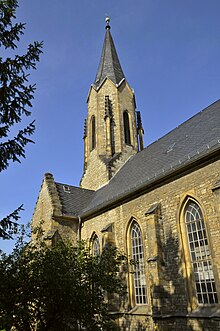Johann Volkmar Sickler
Johann Volkmar Sickler (born January 19, 1742 in Günthersleben in the Gotha district ; † March 31, 1820 in Kleinfahner ) was a German pomologist . In 1770 he took up the office of pastor in Kleinfahner, which he held until his death.
Life
Sickler was born in Güntersleben as the son of a farmer and brandy distiller. He grew up in very poor conditions. He started school at the age of four and from 1755 attended the Illustre high school in Gotha. After graduating from school, he earned his living a. a. as a barber and organist before he began studying theology at the University of Jena in 1763. In 1766 he left the University of Jena and went to Güntersleben as a preacher, where he continued his studies.
In 1767 he accepted a position as court master at the Oberamtmann Carl Ludwig Alexander von Seebach in Altenburg. In December 1770 he was fetched by Friedrich Wilhelm von Seebach, the provost of Naumburg, to his estate in Kleinfahner , a place on the Fahner Höhe near Erfurt. Here he took the position of pastor in March 1771. When he took office as pastor, his duties also included managing an extensive agricultural business. He devoted himself in particular to a large tree nursery, where he made significant progress in improving fruit tree care and refining the grafting methods. In his writings he systematically examined and documented the peculiarities, requirements and advantages of the various types of fruit.
Together with his employer Friedrich Wilhelm von Seebach, Sickler made a significant contribution to establishing fruit growing in the area, for which the Fahner Heights are known to this day (“Fahnersche Kirschdörfer”). Since then, fruit growing has been an important branch of industry and makes the area particularly attractive.
Sickler ran his own tree nursery, where he cultivated and selected numerous types of fruit. He sent Edelreiser all over Germany and abroad.
Sickler's son was the high school teacher and classical scholar Friedrich Carl Ludwig Sickler (1773-1836).
plant
Sickler has become known for his achievements in horticulture . For this he wrote numerous writings. From 1794 to 1804 he was the publisher, editor and main author of the first German fruit growing magazine, Der teutsche Obstgärtner , which was published by Bertuch's publishing house in the industrial comptoir. A total of 432 types of fruit were described in the 22 volumes by the Teutsche Obstgärtner . The colored illustrations were created by the draftsman and trained confectioner Ernst Heinrich Gebhardt (1757–1813) from Töttelstädt . The magazine had to be discontinued in 1804 for economic reasons as it had not been possible to gain enough subscribers.
From 1804 to 1810 Sickler was the editor of the Allgemeine Teutsche Gartenmagazin , which was also published by Friedrich Justin Bertuch in the publishing house of the Industrie-Comptoir.
Also along with Bertuch Sickler was from 1794 to 1820 a fruit Cabinet out in which the German Fruit Gardener described core -, stone - and nuts were presented as lifelike wax models. The model fruits were also initially made by Ernst Heinrich Gebhardt. After his death, the models were produced by the Gotha porcelain painter Ch. M. Sundhausen. After Bertuch's death in 1822, the collection was not continued. The Thuringian Horticultural Association took over. The Museum der Natur in Gotha has 179 wax fruits from the “Pomological Cabinet” by Bertuch & Sickler.
Further literature by him are the garden memorandum for lovers of horticulture (1808) and a garden encyclopedia for inexperienced horticulturalists (1811). He translated several French books on fruit growing into German. His tasks in the management of the farm gave him considerable knowledge in the field of agriculture, which ultimately led him to publish a collective work from 1802 to 1812 with the title Die deutsche Landwirthschaft in its entirety .
Honors
In recognition of his achievements, he was made an external member of the Royal Horticultural Society in London, a member of the Erfurt Academy of Non-Profit Sciences , the Economic Society in Leipzig and the Agricultural Society in Hanover. In his parish he was generally recognized and venerated as a pastor and teacher.
See also
Web links
- Carl Leisewitz: Sickler, Johann Volkmar . In: Allgemeine Deutsche Biographie (ADB). Volume 34, Duncker & Humblot, Leipzig 1892, p. 161 f.
- Fahner Höhe internet portal
Individual evidence
- ^ W. Schuricht: The Thuringian pomologist Johann Volkmar Sickler. In: Pomologen-Verein e. V .: Annual Bulletin 2001, p. 6
- ^ W. Steiner, U. Kühn-Stillmark: Friedrich Justin Bertuch - A life in classic Weimar between culture and commerce. Böhlau Verlag Cologne, Weimar 2001, p. 21.
- ↑ E. Apel: Johann Volkmar Sickler - A contribution to his biography. In: F. Lucas: Pomological monthly books - Allgemeine Deutsche Obstbauzeitung. Published by Eugen Ulmer, Stuttgart 1895, p. 161.
- ^ W. Schuricht: The Thuringian pomologist Johann Volkmar Sickler. In: Pomologen-Verein eV: Annual Issue 2001, p. 7.
- ^ W. Steiner, U. Kühn-Stillmark: Friedrich Justin Bertuch - A life in classic Weimar between culture and commerce. Böhlau Verlag Cologne, Weimar 2001, p. 21
| personal data | |
|---|---|
| SURNAME | Sickler, Johann Volkmar |
| BRIEF DESCRIPTION | German pomologist |
| DATE OF BIRTH | January 19, 1742 |
| PLACE OF BIRTH | Günthersleben , district of Gotha |
| DATE OF DEATH | March 31, 1820 |
| Place of death | Kleinfahner |


